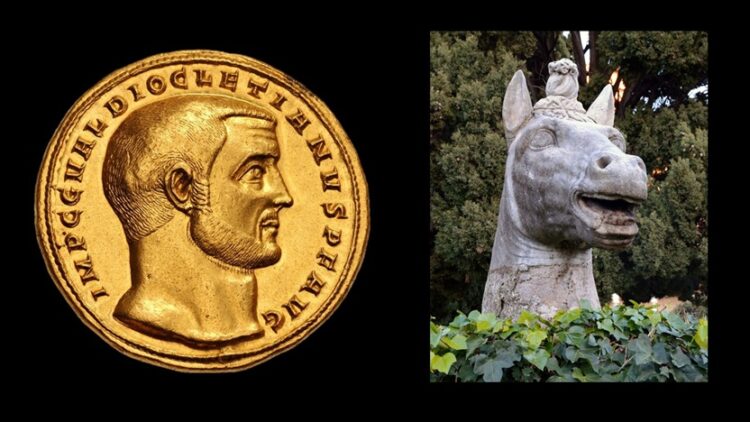Diocletian’s Horse
“Save it for your horse.”
—Oedipus Tex, P.D.Q. Bach (Peter Schickele)
While Diocletian owned the home
Octavian built (although he ruled
from Asia Minor, don’t be fooled,
He was the emperor of Rome),
ambition and a lack of sense
brought some in Egypt to rebel
against his title. To compel
obedience through recompense,
the purple soldier took the field,
trapping insurgents in their nest
at Alexandria. Then, lest
the city fail to promptly yield
the new Augustus made decree
that all within its walls would pay
for obstinate less-majesté
until blood reached his horse’s knee.
But when he finally took the city,
the emperor’s stallion slipped in gore
and took a knee like to implore
the heavens for a drop of pity.
After the steed regained its feet,
the dominus dismounted and
discovered that a crimson band
acquired from the bloody street
had stained the carpals of his horse.
Though Diocletian was no sage,
this was an omen to assuage
and turn his anger to remorse.
The Alexandrian account
by grace was cleared of all arrears,
and avenues were filled with tears
enough to wash the tetrarch’s mount.
The emperor was prayed divine
By fathers and by hoi polloi,
but knowing their true source of joy,
They raised a bronze to his equine.
Memorial Service
The narrow windows squeeze December light
so tightly that it faints onto the floor
and soaks into the carpet’s velvet night
that stretches darkly out the room’s lone door.
The interest on her principal has grown
to be three generations now. They come
with other relatives and friends to own
life’s debt through funerary symbolum.
After the crowd and cousins have been seated,
the undertaker leads the closest kin
into the room as if they were defeated
Goths in a Roman triumph to begin
her last solemnity. The hymns, the prayer,
the homily assert the ancient creed
that Christ has vanquished death, yet where the air
is stale with mums, flesh wishes to proceed
from hope to sight, faith’s final resolution,
in finding sacrament to signify
that life will triumph over sin’s pollution
and bodies live again, although they die.
We ponder what we seem to be without.
Then in the back, a grandchild starts to sing
a nursery song that so dispels our doubt
we know that winter will concede to spring.
Duane Caylor is a physician in Dubuque, IA. His poetry has appeared in a number of journals, including First Things, Measure, Slant, and Blue Unicorn.















Duane, these are two excellently written poems that compel the reader from the very beginning to move from verse to verse. Both poems gave me a feeling as though I were there. The second one has such a wonderfully enchanting conclusion.